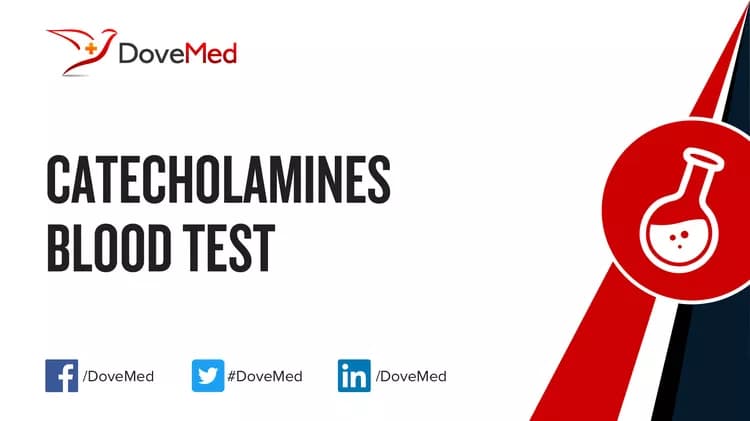What are the other Names for this Test? (Equivalent Terms)
- Epinephrine Blood Test
- Fractionated Catecholamines Blood Test
- Norepinephrine Blood Test
What is Catecholamines Blood Test? (Background Information)
- Catecholamines are a group of hormones necessary for the ‘fight-or-flight’ response and the regulation of metabolism. Major catecholamines include epinephrine (or adrenaline), norepinephrine (or noradrenaline), and dopamine
- Catecholamines are produced during times of stress, by the adrenal (or suprarenal) glands, a pair of pyramid-shaped organs that sit atop each kidney. Specifically, chromaffin tissue within the medulla (or center) of the adrenal glands produce catecholamines. Catecholamines travel through the blood and exert their effects on most cells in the body
- The kidneys excrete catecholamines into the urine after they are broken down. Epinephrine is broken down into metanephrine; norepinephrine is broken down into normetanephrine; and dopamine is broken down into homovanillic acid
- Disorders of the adrenal gland and certain cancers may result in significantly elevated levels of catecholamines and their byproducts in blood and urine
- The Catecholamines Blood Test is a test to assess the levels of catecholamine hormones in blood. It is used to diagnose adrenal gland disorders and hormone-releasing tumors (or neuroendocrine tumors)
What are the Clinical Indications for performing the Catecholamines Blood Test?
Following are the clinical indications for performing the Catecholamines Blood Test:
- Chronic high blood pressure, especially when unresponsive to normal therapy
- Rapid heart rate
- Sweating
- Headaches
- Anxiety
- Flushing
- Follow-up to an abnormal imaging test
How is the Specimen Collected for Catecholamines Blood Test?
Following is the specimen collection process for Catecholamines Blood Test:
Sample required: Blood
Process: Insertion of a needle into an arm vein.
Preparation required: No special preparation is needed prior to the test.
What is the Significance of the Catecholamines Blood Test Result?
The significance of Catecholamines Blood Test is explained:
- Increased levels of catecholamines may indicate:
- Excessive stress
- Pheochromocytoma
- Ganglioblastoma
- Ganglioneuroma
- Hypothyroidism
- Long-term manic-depressive disorders
- Myocardial infarction (MI)
- Neuroblastoma
- Shock
- Decreased levels of catecholamines may indicate:
- Autonomic nervous system disorder
- Orthostatic hypotension
- Parkinson’s disease
The laboratory test results are NOT to be interpreted as results of a "stand-alone" test. The test results have to be interpreted after correlating with suitable clinical findings and additional supplemental tests/information. Your healthcare providers will explain the meaning of your tests results, based on the overall clinical scenario.
Additional and Relevant Useful Information:
- Certain factors may interfere with the results of the Catecholamines Blood Test. These include diabetes, strenuous exercise, psychological stress, and certain foods that contain methylxanthine, such as coffee, chocolate, and tea
- Adrenal gland tumors are usually not cancerous, i.e., they do not normally spread to other tissues (a process known as metastasis)
Certain medications that you may be currently taking may influence the outcome of the test. Hence, it is important to inform your healthcare provider, the complete list of medications (including any herbal supplements) you are currently taking. This will help the healthcare provider interpret your test results more accurately and avoid unnecessary chances of a misdiagnosis.
Related Articles
Test Your Knowledge
Asked by users
Related Centers
Related Specialties
Related Physicians
Related Procedures
Related Resources
Join DoveHubs
and connect with fellow professionals


0 Comments
Please log in to post a comment.